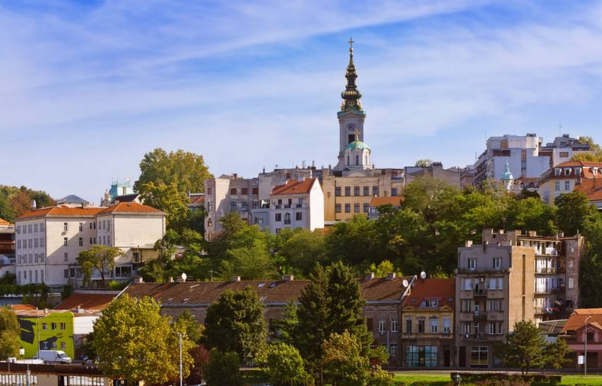BELGRADE, Oct. 8 (Xinhua) -- China and seventeen Central and Eastern European Countries (CEECs) kicked off a conference on innovation cooperation here on Tuesday, bringing governments, companies and academics in the innovation ecosystem to seek synergy.
Over 270 Chinese participants from 11 provinces and 4 municipalities took part in the two-day conference, which on its first morning saw 12 agreements signed between Chinese and Serbian partners.
The China-CEEC format was established in 2012. Since then, a series of gatherings of political and business leaders from China and 17 CEECs were held and resulted in enhanced cooperation between participating countries.
Serbian Prime Minister Ana Brnabic said at the opening ceremony that Serbia wants to support wider cooperation throughout the CEECs when it comes to the development of artificial intelligence, robotics and digitalization.
Wang Zhigang, the Chinese Minister of Science and Technology, said that CEECs have long been important partners to China in scientific and technology cooperation, where deep trust and friendship have been established.
NEW MARKET
In addition to political leaders, academics and businessmen on Tuesday morning thronged Hall 4 of the Belgrade Fair, where the conference took place.
From Nicolaus Copernicus, Marie Curie to John von Neumann, Central and Eastern Europe gave births to a lot of remarkable innovators in history.
In the case of Serbia, Nikola Tesla, an ethnic Serb, is known for designing the modern alternating current (AC) electricity supply system through a series of adventurous work from late 19th Century on. The Nikola Tesla Museum took a corner here to showcase Tesla's achievement.
Outside the Tesla corner, companies based in China and the CEECs brought their best to seek opportunities.
The participants of the conference here, for the first time in Serbia, see the capacities of application of 5G technologies through its activation, as well as to test the simulator of high-speed train movement in different weather conditions -- brought by Chinese companies including Huawei.
Matteo Venerucci, Chief Neuromarketing Officer of the Serbia-based Trizma Neuro, hopes to open the Chinese market via being present at the conference.
Founded by Venerucci, an Italian, and a Greek scientist, the company engages in the field of neuromarketing.
His company combines eye-tracking and electroencephalography to serve clients such as banks. That means "we know exactly what they (customers) are looking and their brain response, so the banks can develop the layout of the branch to be more comfortable for the customers, more understandable and of course to increase the business," Venerucci told Xinhua.
"China is a huge market and we would love to be in China, but we need more resources to approach the Chinese market," he said.
Teodesk, a Belgrade-based software maker, has been mostly working in the Serbian market, but is also looking to expand. Its cloud-based collaboration management software is designed to manage workforce and facilitate collaboration between teams.
"Here we communicated with a few and we also got an invitation to a conference in China, so we are hoping to make some connections," Sandra Ldoski, a marketing manager, told Xinhua, noting that the current Serbian- and English-language interface could be easily translated to other languages.
DEEPENING PARTNERSHIP
The cooperation between China and CEECs in innovation has blossomed in other aspects.
Earlier this year, the Serbian government and China Road and Bridge Corporation signed an investment agreement for an industrial park to be established in Belgrade, covering a total of 3.2 square kilometers. It will be a platform for overseas, high-tech companies to enter Serbia and the region.
China's success in breeding a wave of successful innovative companies is being keenly watched here, as start-ups here increasingly look for more than just market access.
Poduhvat is a Serbian company in renewable energy technology that designed smaller-than-conventional sized wind turbines, which it says could be flexibly deployed in cities, on ships or above houses and produce much less noises than conventional ones.
Predrag Paunovic, co-founder of Poduhvat, told Xinhua that he was looking for "partners to start production in China."
When asked if he had sought partnership in Europe, he said "we are competition for them," and since Europeans are sticking to the conventional wind turbines, "they do not wish to change anything."
"We need somebody who is as smart and ambitious like the Chinese," he said.
Jia Jingdun, Director of China's Torch High Technology Industry Development Center, said both sides should jointly build cross-border innovation platforms and vehicles offering international services to support business cooperation.




 A single purchase
A single purchase









